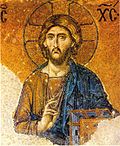- Jacob Bar-Salibi
-
Part of a series on Eastern Christianity 
History Orthodox Church History
Specific regions:
Byzantine Empire
Ecumenical council
Christianization of Bulgaria
Christianization of Kievan Rus'
East-West Schism
Asian Christianity
Coptic Egypt · UkraineTraditions Orthodox Church
Others:
Oriental Orthodoxy
Ethiopian Tewahedo Church
Coptic Church
Church of the East
Eastern Catholic Churches
Syriac ChristianityLiturgy and worship Sign of the cross
Divine Liturgy
Iconography
Asceticism
OmophorionTheology Hesychasm · Icon
Apophaticism
Filioque clause
Miaphysitism
Monophysitism
Diophysitism
Nestorianism
Theosis · Theoria
Phronema · Philokalia
Praxis · Theotokos
Hypostasis · Ousia
Essence vs. Energies
MetousiosisJacob Bar-Salibi also known as Dionysius Bar-Salibi was the best-known and most prolific writer in the Syriac Orthodox Church of the twelfth century.
Bar-Salibi was, like Bar-Hebraeus, a native of Malatia on the upper Euphrates. In 1154 he was created bishop of Marash by the patriarch Athanasius VII; a year later the diocese of Mabbog was added to his charge.
In 1166 Michael the Great, the successor of Athanasius, transferred him to the metropolitan see of Amid in Mesopotamia, and there he remained till his death in 1171. Of his writings probably the most important are his exhaustive commentaries on the text of the Old and New Testaments, in which he skillfully interwove and summarized the interpretations of previous writers such as Ephrem, Chrysostom, Cyril, Moses Bar-Kepha and John of Dar, whom he mentions together in the preface to his commentary on St Matthew. Among his other main works are a treatise against heretics, containing inter alia a polemic against the Jews and the Muslims; liturgical treatises, epistles and homilies.
'Jacob' was his baptismal name; 'Dionysius' he assumed when consecrated to the bishopric.
See also
- alogi
- Gospel of John
- Ediderunt I. Sedlacek
- Gaius of Rome
References
 Chisholm, Hugh, ed (1911). "Bar-Ṣalībī, Jacob". Encyclopædia Britannica (11th ed.). Cambridge University Press.
Chisholm, Hugh, ed (1911). "Bar-Ṣalībī, Jacob". Encyclopædia Britannica (11th ed.). Cambridge University Press.
External links
Categories:- Syriac writers
- Syriac people
- Anti-Gnosticism
- 1171 deaths
Wikimedia Foundation. 2010.
